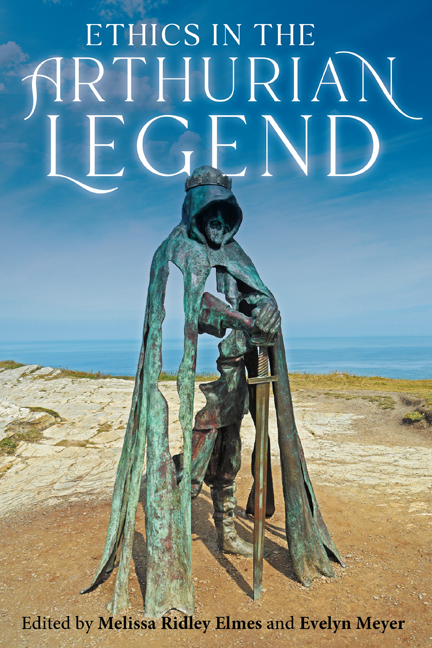Book contents
- Frontmatter
- Contents
- List of Contributors
- Foreword
- Acknowledgments
- Introduction
- 1 Arthurian Ethics before the Pentecostal Oath: In Search of Ethical Origins in Culhwch and Olwen
- 2 Too Quickly or Not Quickly Enough, Too Rash and Too Harshly: The Arthurian Court’s Lack of Ethics in Hartmann von Aue’s Erec and Iwein and Wolfram von Eschenbach’s Parzival
- 3 The Ethics of Arthurian Marriage: Husband vs Wife in Hartmann von Aue’s Iwein
- 4 Arthurian Ethics and Ethical Reading in the Perlesvaus
- 5 Translation Praxis and the Ethical Value of Chivalry in the Caligula Brut
- 6 Imperial Ambitions and the Ethics of Power: Gender, Race, and the Riddarasögur
- 7 Lowland Ethics in the Arthur of the Dutch
- 8 Contesting Royal Power: The Ethics of Good Lordship, Sir Gawain and the Green Knight, and the March of Wales
- 9 “As egir as any lyoun”: The Ethics of Knight-Horse Relationships in Lybeaus Desconus
- 10 Malory’s Ethical Dinadan: Moderate Masculinity in a Crisis of Hypermasculine Chivalry
- 11 Virtus, Vertues, and Gender: Cultivating a Chivalric Habitus in Thomas Malory’s Tale of Sir Gareth
- 12 Kingly Disguise and (Im)Perception in Three Fifteenth- Century English Romances
- 13 “Adventure? What is That?” Arthurian Ethics in/and the Games We Play
- 14 The Ethics of a New Edition of Sir Thomas Malory’s Le Morte Darthur – and More Evidence for the Superiority of the Winchester Manuscript
- 15 The Ethics of Writing Guinevere in Modern Historical Fiction
- Afterword
- Index
6 - Imperial Ambitions and the Ethics of Power: Gender, Race, and the Riddarasögur
Published online by Cambridge University Press: 10 January 2024
- Frontmatter
- Contents
- List of Contributors
- Foreword
- Acknowledgments
- Introduction
- 1 Arthurian Ethics before the Pentecostal Oath: In Search of Ethical Origins in Culhwch and Olwen
- 2 Too Quickly or Not Quickly Enough, Too Rash and Too Harshly: The Arthurian Court’s Lack of Ethics in Hartmann von Aue’s Erec and Iwein and Wolfram von Eschenbach’s Parzival
- 3 The Ethics of Arthurian Marriage: Husband vs Wife in Hartmann von Aue’s Iwein
- 4 Arthurian Ethics and Ethical Reading in the Perlesvaus
- 5 Translation Praxis and the Ethical Value of Chivalry in the Caligula Brut
- 6 Imperial Ambitions and the Ethics of Power: Gender, Race, and the Riddarasögur
- 7 Lowland Ethics in the Arthur of the Dutch
- 8 Contesting Royal Power: The Ethics of Good Lordship, Sir Gawain and the Green Knight, and the March of Wales
- 9 “As egir as any lyoun”: The Ethics of Knight-Horse Relationships in Lybeaus Desconus
- 10 Malory’s Ethical Dinadan: Moderate Masculinity in a Crisis of Hypermasculine Chivalry
- 11 Virtus, Vertues, and Gender: Cultivating a Chivalric Habitus in Thomas Malory’s Tale of Sir Gareth
- 12 Kingly Disguise and (Im)Perception in Three Fifteenth- Century English Romances
- 13 “Adventure? What is That?” Arthurian Ethics in/and the Games We Play
- 14 The Ethics of a New Edition of Sir Thomas Malory’s Le Morte Darthur – and More Evidence for the Superiority of the Winchester Manuscript
- 15 The Ethics of Writing Guinevere in Modern Historical Fiction
- Afterword
- Index
Summary
My research on Arthuriana from the Global North Atlantic tends to focus on two interrelated axes. First, I pay careful attention to the dissemination of Arthurian texts throughout Europe, depicting the nonlinear circulation of the materials, and how they shape and are shaped by the political, historical, and commercial interconnections between Africa, Europe, and the Islamicate worlds. Second, I focus on the ideologies that circulated within these texts, finding that they tend to support Christian chivalric ideologies because ethically speaking, these texts are part of a system constructing a medieval European self by erasing European diversity, dehumanizing Muslims and other racial and religious groups, and normalizing these violent ideologies. In other words, these Arthurian texts function within an ethical framework of whiteness because the texts normalize certain forms of dehumanization; the texts normalize exclusionary violence based on race.
Nevertheless, the inclusion of this chapter in a volume on Arthurian ethics has less to do with the ethics inherent in the texts and more to do with my own ethics. Shokoofeh Rajabzadeh's work has helped me articulate my own ethical stance vis-à-vis my research. She writes:
Who I am shapes my canon. It determines what I read, why I read, how I read, and what I experience while reading. And yet, scholars’ fears of anachronism, their desires to protect objects of study yield criticism that welcomes me only as an academic, not as a Muslim. The depoliticized observational and analytical objectivity that we have learned to value as reliable, authoritative, and accurate in scholarly academic inquiries asks me to decenter my Muslim, Iranian heritage and to sideline my rage with the Islamophobia in the objects of study. But I cannot. I will not. As a result, I am left with the laborintensive process of making explicit for myself the Islamophobia and racism of the primary material that scholars have chosen to keep implicit in their scholarship.
Rajabzadeh points out that what we have learned to value as academics – what she calls a “depoliticized observational and analytical objectivity” that is supposedly “reliable, authoritative, and accurate scholarship” – is ultimately tied to whiteness because it is tied to exclusion.
- Type
- Chapter
- Information
- Ethics in the Arthurian Legend , pp. 131 - 150Publisher: Boydell & BrewerPrint publication year: 2023

